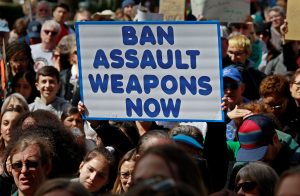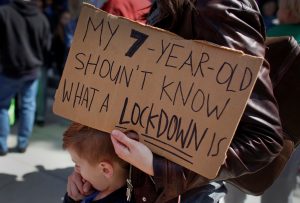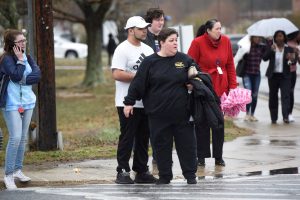
By Hilary Russ and Laila Kearney
NEW YORK (Reuters) – Before the ink could dry on Florida Governor Rick Scott’s signature last month, critics cried foul over the bill he signed into law to spend $400 million boosting security at schools across the state following February’s Parkland mass shooting.
School officials, local sheriffs and Democrats opposed different provisions, including one to provide $67 million to arm teachers. Educators, in particular, voiced concerns that the state will strip money from core education funding to pay for the new school resource officers and beefed up buildings.
“We are a very lean state,” said Florida state Senator Jose Javier Rodriguez, a Democrat who voted against the bill. “If we’re spending money somewhere, we’re taking it from somewhere else.”
In the wake of the high school shooting in Parkland, Florida that killed 17 people, at least 10 U.S. states have introduced measures to increase funding for hardening of school buildings and campuses, add resource officers and increase mental health services, according to Reuters’ tally.
Many of the proposals outlined the need for bulletproof windows, panic buttons and armored shelters to be installed in classrooms. Some legislation called for state police or sheriff’s departments to provide officers to patrol public schools.
Altogether, more than 100 legislative bills to address school safety, not all of which have funding components, have been introduced in 27 states since the Feb. 14 shooting at Florida’s Marjory Stoneman Douglas High School, according to data provided by the National Conference of State Legislatures.
But states do not usually have extra money on hand or room to raise taxes. So to pay for the measures, states are mostly shifting money away from other projects, dipping into reserves or contemplating borrowing.
“I would characterize these proposals and the bills that were passed, for example Florida and Wisconsin, as primarily shifting funding from other priorities,” said Kathryn White, senior policy analyst at the National Association of State Budget Officers.
Calls for more gun control and more safety measures have come during peak budget season for nearly all states, whose legislatures spend the spring in debates that shape the coming year’s budget starting July 1.
STATE BY STATE
Wisconsin Governor Scott Walker called a special legislative session last month, when lawmakers agreed to create a $100 million school safety grant program.
The money will come out of the state’s general fund. But the spending, coupled with tax cuts and other pending legislation, will leave that fund with reserves of roughly $185 million – enough to run state government for less than four days in the event of a fiscal emergency, according to Jon Peacock, director of the think tank Wisconsin Budget Project.
“That is far less of a cushion than a fiscally responsible state should set aside,” Peacock said.
Funding the safety measures also means that some economic development programs for rural counties did not get funded and a one-time sales tax holiday was scaled back, he said.
In Maine, lawmakers are considering borrowing $20 million by issuing 10-year general obligation bonds to fund loans to school districts for security enhancements.
New Jersey lawmakers are also looking to borrow. On March 26, state senators tacked an extra $250 million for school security onto an existing bill for $500 million of bonds to expand county vocational colleges. The legislature has not yet voted on the measure.
Maryland, Alabama, Arkansas, Tennessee and Indiana are also increasing – or trying to increase – funding for school security measures since Parkland.
In Florida, the legislature passed safety spending while approving an increase of only $0.47 per pupil in funding used to cover teacher pay raises, school bus fuel and other operational expenses for education.
“We see $400-plus million in school safety, which we absolutely applaud, but you can’t do that at the expense of your core education program,” Broward County schools Superintendent Robert Runcie said shortly before Scott signed the budget.
Stoneman Douglas is among the schools Runcie, who also heads the Florida Association of District School Superintendents, oversees.
To be sure, some state and local governments have been adding money for school safety measures for years, particularly after 20 children and six adults were killed in a shooting in Connecticut’s Sandy Hook Elementary School in 2012.
Some critics, particularly Democrats, say measures that only beef up infrastructure or do not create recurring funds fall short of the mark.
Dan Rossmiller, government relations director of the Wisconsin Association of School Boards, said in a memo to lawmakers in March that individual districts also need money for prevention and intervention, including education services for expelled students and anti-bullying programs, and other purposes.
“Funding for only ‘hardening’ school facilities, while welcome, is likely not going to be sufficient to address the full range of locally identified needs,” he said.
(Reporting by Hilary Russ and Laila Kearney; Editing by Daniel Bases and Chizu Nomiyama)











